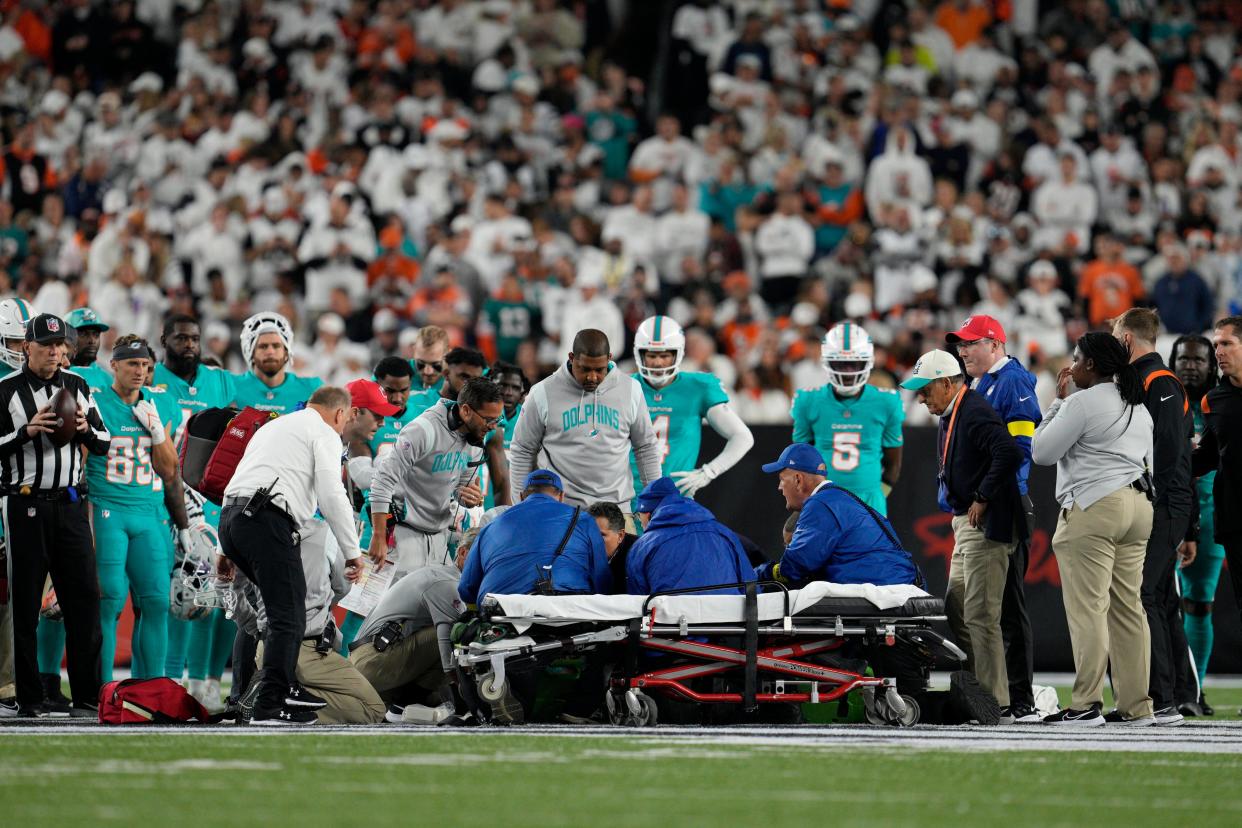Can you fly with a concussion? What to know after Tua Tagovailoa's hospitalization

- Oops!Something went wrong.Please try again later.
A silence fell upon Paycor Stadium in Cincinnati Thursday night as medical staff hunched over Miami Dolphins quarterback Tua Tagovailoa, who laid stiff on the field after he smacked the back of his head on the ground during a play. Fans watched as Tagovailoa's body froze up in an apparent “fencing response,” common after traumatic head injuries.
Some former players and fans voiced outrage, as the scary scene came just days after Tagovailoa was at the center of another concerning incident where he struggled to walk and stumbled after taking a hit in a game on Sunday. He returned to that game after going through concussion protocol, and the team announced he had only sustained a back injury.
Many were skeptical about the extent of Tagovailoa's injuries in Sunday's game, and the NFL and NFL Players Association launched an investigation on Monday into his concussion evaluation.
He geared up again Thursday night, when he was thrown to the ground during a tackle by Cincinnati Bengals defensive tackle Josh Tupou. Dolphins coach Mike McDaniel confirmed after the game the quarterback suffered a concussion.
The NFL has long grappled with questions of player safety. Studies have linked head trauma in former NFL players to a degenerative brain disease called CTE, which is only diagnosed posthumously.
What is the NFL's concussion protocol? Tua Tagovailoa injury puts policy in spotlight
Many late former NFL players had CTE: What to know about the disease.
Tagovailoa was released from the hospital to fly home with the team. That raised the question: Is it safe to board a flight with a possible concussion? Here’s what we know.
Should you fly on a plane after a concussion?
Whether it's safe to fly with a concussion was unclear for a long time.
People have anecdotally reported headaches, dizziness, feeling foggy and other related symptoms when flying even without being concussed, according to Dr. Kevin Bickart, a neurologist at UCLA.
As a result, Bickart said, some may assume that flying could be dangerous or worsen symptoms for those with a concussion.
But two years ago, Bickart along with colleagues at UCLA’s concussion research program and other universities, published a cohort study in the peer-reviewed journal JAMA Network Open that concluded “there was no association between flying and worsened recovery or symptoms after concussion.”
It was the first large-scale study exploring this question. It compared 92 participants who flew within three days of sustaining a concussion to 1,383 participants who did not fly after sustaining a concussion. It found no significant difference in symptoms or recovery times between the two groups.
“These findings may help guide future recommendations on flight travel after concussion in athletes,” the report reads.
The results surprised the researchers, according to Bickart, who thought flying would correlate with longer recovery times and worsened symptoms.
But Bickart said there were limitations to the data, and that further studies were needed to determine with greater confidence the safety of flying within a shorter time period after a concussion was sustained.
“With a concussion it really depends how symptomatic they are,” Dr. Alan Shahtaji, director of UC San Diego’s Sports Concussion Clinic and a physician for the U.S. Women’s National Team, told USA TODAY.
“What we would do is really assess how the athlete is feeling, and if we weren’t concerned about other injuries … like a [skull] fracture or a bleed, then at that point I think it would be reasonable to fly home with the athlete,” Shahtaji said.
This article originally appeared on USA TODAY: Can you fly with a concussion? What to know after Tua Tagovailoa hit

